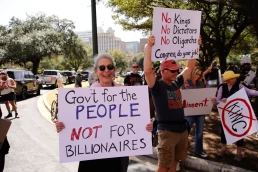Big corporations donated heavily to Trump’s inaugural fund. Just a few months later, federal cases against them are being dropped.
By Rick Claypool, OtherWords
“Corporations First.” That’s the slogan that would truthfully describe the Trump administration’s approach to law enforcement, not “America First.”
A new investigation by my organization shows that the Trump administration is dropping investigations and enforcement actions against corporations that showered money on Trump’s inauguration earlier this year.
Seventy-one big businesses, which were facing at least 102 ongoing federal enforcement actions at the time of Trump’s inauguration, collectively gave a whopping $57 million to the Trump-Vance inaugural fund, we found. And many may now be collecting special favors.

Trump’s inaugural haul from corporations facing investigations and lawsuits alone is comparable to the total amount raised for the inaugurations of President Obama in 2009 ($53 million) and Biden in 2021 ($62 million). And it’s just a third of the record-breaking $239 million Trump collected overall, $153 million of which came from corporate donors.
Regardless of president or party, private funding for the presidential inauguration poses a serious threat of corrupt influence buying by corporations and the wealthy. Unlike the vast majority of Americans, they can ingratiate themselves to an incoming administration with six- and seven-figure checks.
Donations by for-profit corporations are particularly suspect — corporations’ purpose, after all, is to amass wealth for private investors, an agenda that frequently pits them against laws and regulations that protect consumers, workers, and the broader public interest.
We may not know exactly what favors corporations might seek. But it’s reasonable to assume that getting rid of penalties or investigations for ripping off consumers, exploiting workers, polluting our environment, and engaging in illegal and unfair business practices would be high on the list.
Public Citizen has compiled a list of more than 500 enforcement actions against corporations that the Trump administration inherited from the Biden administration. During President Trump’s first 100 days alone, federal agencies halted or dropped at least 126 of these enforcement actions.
These include actions against 15 corporate inauguration donors whose cases were dismissed or withdrawn, plus six whose cases were halted. These 21 corporations collectively donated $18 million to the inaugural fund.
These include companies accused of violating consumer financial protections, such Bank of America, Capital One, JPMorgan, and Walmart; some crypto businesses accused of violating securities laws, such as Coinbase, Crypto.com, Kraken, and Ripple; private prison corporations that allegedly mistreated inmates, like CoreCivic and GEO Group; and businesses accused of engaging in illegal bribery schemes in foreign countries, including Cognizant, Pfizer, and Toyota.
Time will tell whether the payments by other big corporate inauguration donors — like Amazon, Apple, Boeing, FedEx, Goldman Sachs, Google, Johnson & Johnson, Nvidia, and Pilgrim’s Pride — will see enforcement go away, too.
To be fair, some cases against corporate inauguration donors do appear to be proceeding unhindered. The antitrust cases against Google and Meta are proceeding, the FTC’s case against Uber for deceptive billing practices has been filed, and Gilead Pharmaceuticals is being required to pay $202 million to settle allegations of paying illegal kickbacks to doctors.
These signs of ongoing enforcement are a good thing. But among the more than 100 cases being dropped and halted, they’re exceptional. Because of the mass firings of federal workers at enforcement agencies, they likely represent the conclusion of past enforcement efforts, not the continuation of an ongoing trend.
Dropping corporate cases en masse, as the Trump administration is doing, is a greenlight for corporate lawlessness. It portends a return to recklessness and greed that fueled corporate catastrophes like Wall Street’s 2008 financial crisis, the Oxycontin-fueled opioid crisis, BP’s oil spill disaster, and Boeing’s deadly 737 Max crashes.
It is the definition of “corporations first.”
Rick Claypool is a research director for Public Citizen, where he focuses on corporate crime and wrongdoing and the ways corporate power distorts democracy. This op-ed was distributed by OtherWords.org.
Recent Posts
How to Organize Safely in the Age of Surveillance
February 22, 2026
Take Action Now From threat modeling to encrypted collaboration apps, we’ve collected experts’ tips and tools for safely and effectively building a…
‘The Siege Must Be Broken’: Countries Called to Ship Fuel to Cuba After Trump Tariffs Struck Down
February 21, 2026
Take Action Now The US Supreme Court’s ruling “implies that Trump’s recent order imposing tariffs on countries selling oil to Cuba exceeds the…
Elite Depravity in Imperial Decline, A Zero Hour Conversation With Richard Wolff
February 20, 2026
Take Action Now “The system self-selects for psychopathy… the most sociopathically obsessive competitor and accumulator of personal power and…
Economics of Health For All: The Plan to Put Health at the Heart of the Global Economy
February 20, 2026
Take Action Now At the World Health Assembly in May, member states may endorse an unprecedented strategy declaring that health is not a cost – but…




